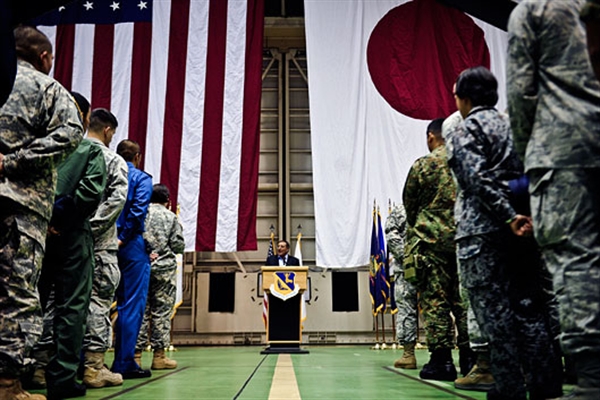WASHINGTON, Sept. 21, 2010 — The addition of U.S. forces in northern Afghanistan has changed the face of the NATO mission there, the top U.S. commander for the NATO International Security Assistance Force element in the region said today.
The additional troops – some 6,000-plus – come from 10th Mountain Division’s 1st Brigade Combat Team and 4th Infantry Division’s 4th Combat Aviation Brigade. The added forces are having a positive effect in security efforts as well as in training Afghan soldiers and police, Army Col. Sean Mulholland, deputy commander of Regional Command North, told Pentagon reporters in a video news conference from his headquarters in Afghanistan.
“That has been a game-changer up here,” Mulholland said.
The colonel explained that the 10th Mountain Division troops aren’t responsible for any particular battle space. Rather, he said, they are partnered with Afghan police under the command and control of provincial reconstruction teams, which are led by State Department civilians.
“[Their] major task is to raise the level or capability of the Afghan National Police, and they’ve done a great job so far,” he said. “With the 4th CAB, they’ve brought a lot of combat power, a lot of agility, a lot of movement and mobility, and obviously more freedom of action, to include casualty evacuation for coalition forces, [Afghan soldiers] and Afghan civilians.”
About 11,000 troops from 16 nations make up the Regional Command North footprint. Maj. Gen. Hans-Werner Fritz of the German army is the top commander there.
Troop numbers there will remain at the current level, with no expectation for a mission change or withdrawal in the near future, Mulholland said.
President Barack Obama’s July 2011 timeline and guidance from Army Gen. David H. Petraeus, commander of U.S. and international forces in Afghanistan, Mulholland explained, represents the date in which leaders and policy makers will begin to discuss transition.
“I don’t see any kind of drastic drawdowns forthcoming in the next few years,” Mulholland said. “It’s going to have to be a timed, phased withdrawal, obviously taking security into account.”
Mulholland declined to speculate when Afghan forces would take the lead in northern Afghanistan, but he did say he is impressed by the progress of Afghan soldiers and police. NATO troops have grown confident in their Afghan counterparts, he said.
“I’ve had four tours here in Afghanistan,” the colonel said. “The first tour, [Afghan soldiers and police] were not up to standard. This fourth tour, I come back and I am absolutely surprised at the quality of their training that they’re now receiving. They are really starting to peak in terms of officer and [noncommissioned officer] professional development and leader training.
“The other factor is the partnering,” he added. “General Petraeus is absolutely on top of and emphasizing partnering with our Afghan partners, whether it be police, Afghan border police or Afghan National Army.
“Everyone understands that in ISAF and understands the standards of partnering,” he continued. “So I think we, as ISAF, are getting better at partnering and helping our Afghan brothers improve in terms of combat [operations] and security [operations].”
Source:
U.S. Department of Defense
Office of the Assistant Secretary of Defense (Public Affairs)

 von
von 
